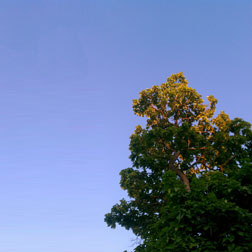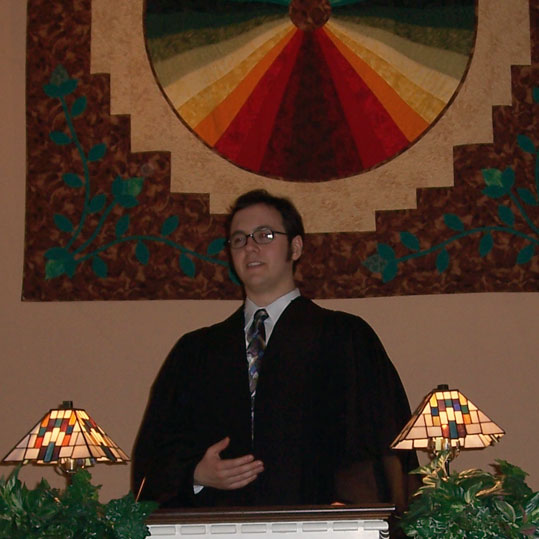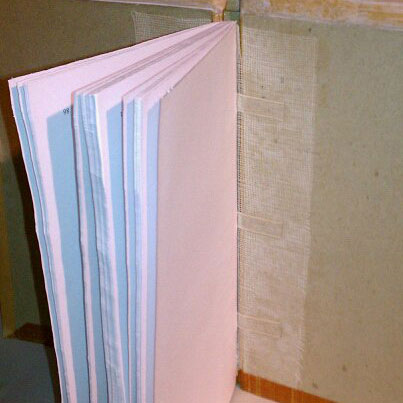David
Theology

I am a Unitarian Universalist, and contemporary religious humanism grounds my theology and ministry. My theology begins in the wonder based in lived encounters with the Holy: awe and joy, sorrow and compassion. It begins in a deep gratitude for life which becomes a call to serve. I am conscious of the limits of reason, of being a small part of a vast universe, of being connected with a power greater than myself. My experience of the hidden wholeness of the world connects me to all people, and I claim my Jewish roots which call me to heal the world and work for justice here and now. I am a religious humanist who believes the world is absent of inherent meaning; yet we make meaning out of this world, that we are held within a deep field of care and compassion uniting all people.
What matters to me most is lived theology. Theology is the house in which we live. It's not the type of house which is so important—how big, or how many windows, or what it's made of—what matters is the kind of life lived inside it. My theology is compassion, wonder, humility, awe, gratitude, laughter, silence, reverence, sorrow. My theology is love. My theology is work for justice. My theology is growth. Theology is a tool: an axe, a hammer, a loom, a saw, a paintbrush. But what matters most is what you make with the tool.
In one of the earliest books of Buddhist scripture, the Buddha is asked a series of questions: Is the world eternal or not? Is the universe finite? Is there a self apart from the body? What happens to a Buddha after death? And instead of answering, the Buddha responds that to ask those questions is like being presented with a person shot through with an arrow, and refusing to remove the arrow before knowing the height and hometown of the person who shot it. The questions may be answerable—it may even be fascinating to investigate—but you can spend your whole life working out an answer without helping the one who is dying.
Philosophy and theology matter to the extent they provide healing for the world, they are relevant to the degree they are vehicles for compassionate action. No parent, grieving the death of their child, wonders if intersubjectivity is a way out of the postmodern paradox of relativism. No couple, struggling with illness or abuse, wants to know whether complexity and emergence provides a vocabulary to talk about how the sacred arises from the mundane. The theoretical foundations matter in that moment only to the extent that they serve as the foundation for care, compassion, service and love.
And this, I believe, is what our liberal religious faith calls us to: first, to find our own ground, our own roots, our own deep faith grounded in our individual theology. We should have a place we come from and know it well. Then hold it lightly, know that our own view is partial, to have facility with metaphor, with parables, to be bridges between our own theology and that of another. My own faith is immeasurably strengthened in conversation and learning from those with other theologies.
Our faith is a plural one, our congregations are filled with people of all different theologies, and my work is to meet them where they are, to help them in their own work to grow their soul and serve the world. I was raised in a humanist and Jewish household—the traditional language of Christianity is not my native tongue. Yet, I can understand, empathize, and support a person who speaks of following Jesus, or speaks of the Spirit, of God, of a power greater than themselves which carries them through life because I have had that same experience. And as I do, I am rooted in my own theological ground of religious humanism, the natural world, and in my Jewish heritage.
There are many times when I stood and stared with awe and wonder and love; overcome by the beauty and complexity and immensity of this world and every person in it. One of the most important religious experiences I have ever had was terribly ordinary: I was walking down an alley with my daughter, almost turned three, the day after a rain storm, and she stopped to point out drops falling from the corner of a roof into a little puddle on the pavement. I crouched down, and together we wordlessly watched the water fall for a few minutes: just that and nothing else, perfect, plain, complete, ordinary, and holy. The Holy is among us everywhere and at all times: give me eyes to see it, let me lead my life as if it is real, and let me lead others to do the same.
Denominational & Community Work

I grew up in the Follen Church Society of Lexington, Massachusetts. I attended religious education classes there from early grade school through the completion of the Coming of Age program. I sang in the choir for seven years and signed the membership book while in college. From those experiences, I know firsthand the power of a caring religious community to shape the spiritual, emotional, and social growth of its kids.
In 2002, Teri and I joined the UU Church of Medford, Massachusetts, and were active there until we completed Divinity School in 2006 and moved to Minnesota. As a member of that church, I served as a Canvass Committee member in 2003 and a co-chair in 2004. In 2004 I also served on the Religious Education Committee and in 2005, I served as a co-chair of the Sabbatical Committee. I taught sixth and seventh-grade religious education classes, and eighth and ninth-grade classes there. I saw how committees sustained the work of that church, and the value of systems to support the work of lay leaders.
At Harvard Divinity School, I was an active member of the Harvard Unitarian Universalist Ministry for Student group, and a member of the board in 2005. In that circle, I felt the care and support that comes in a congregation committed to growing their soul and serving the world. My friendships with those colleagues are strong still.
After moving to Minnesota in 2006, I served on the Committee on Personnel Policy for the Prairie Star District in 2007-2008, re-writing and updating the district's personnel handbook. I've also had the opportunity to do a great deal of supply preaching over the years in Minnesota at a half-dozen different churches and fellowships.
Teri and I are members of the UU Clergy Couples network, and when we've been to General Assembly, we've attended their meeting which takes place each year. Currently, we attend First Universalist Church in Minneapolis.
Non-Professional Interests

My family is the center of my life. Matt is still little enough that I can put him in a backpack carrier and he and Josie and I can walk to the park on a Saturday morning to feed the ducks and look to see if the heron is there. We wrestle and garden together. We build forts in the living room out of a card table and blankets—just as I did when I was little—and I read to Josie each night before I put her to bed, as my dad read to me every night.
I love to cook, to try new recipes and to perfect my technique for staples like the ideal grilled cheese, or the perfectly crisp-moist roast chicken. Being able to cook beautiful, delicious food from scratch—and serve it to good friends—is a delight. I have been slowly, slowly teaching myself to play folk guitar, Stan Rogers and Gordon Bok especially—music I've loved my whole life. I discovered graphic novels while in grad school and became a devoted reader of all sorts and styles of comics.
I worked for several years as a graphic designer at Outcome Sciences and still enjoy reading about and working on graphic projects—book design and book binding, type design and typography. I love the printed book: a cleanly designed page, the typeface which honors the content, the weight and feel in the hand, the way a well-sewn binding is made to be used and to last centuries.
Awards
- 2006 Richard Borden Excellence in Sermon Award
- 2005 Second place, St. Lawrence Foundation for Theological Education essay contest
- 2001 Graduated Manga cum Laude with Thesis Honors from Tufts University
Published Writing
- 2006 UU World Reflection Resisting Reasonable Atrocity: online
Scholarships
- 2005-2006 John C Kimball Bequest Scholarship—Harvard Divinity School
- 2004-2005 Unitarian Universalist Studies Endowment Fund Scholarship—Harvard Divinity School
- 2001-2004 Harvard Divinity School Scholarships
- 2001-2006 UUA Scholarships
Resume
- A business resume with corporate positions, details and recommendations can be found at my LinkedIn profile here.
All site content and design by David and Teri Schwartz
